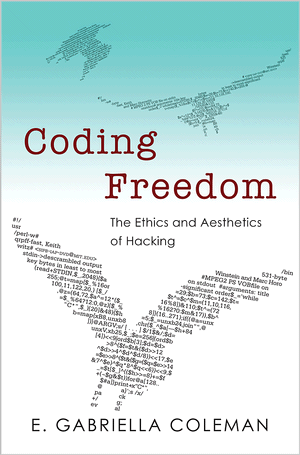Giovanni Ziccardi: Resistance, Liberation Technology and Human Rights in the Digital Age (2013)
Filed under book | Tags: · activism, censorship, crowdsourcing, cyberwar, facebook, hacking, hacktivism, human rights, internet, internet activism, liberation technologies, open data, politics, resistance, social media, surveillance, technology, transparency, twitter, wikileaks

This book explains strategies, techniques, legal issues and the relationships between digital resistance activities, information warfare actions, liberation technology and human rights. It studies the concept of authority in the digital era and focuses in particular on the actions of so-called digital dissidents. Moving from the difference between hacking and computer crimes, the book explains concepts of hacktivism, the information war between states, a new form of politics (such as open data movements, radical transparency, crowd sourcing and “Twitter Revolutions”), and the hacking of political systems and of state technologies. The book focuses on the protection of human rights in countries with oppressive regimes.
– Deals with digital resistance activities all over the world
– First book to describe political and human rights issues in Egypt, Tunisia, Cuba and Yemen
– A critical analysis of the WikiLeaks case
Publisher Springer, 2013
Volume 7 van Law, Governance and Technology series
ISBN 9400752768, 9789400752764
328 pages
via Marcell Mars via Jaromil
Rodolphe Durand, Jean-Philippe Vergne: The Pirate Organization: Lessons from the Fringes of Capitalism (2010/2012)
Filed under book | Tags: · biopiracy, capitalism, economics, hacking, hacktivism, piracy, pirate radio

When capitalism spread along the trade routes toward the Indies…when radio opened an era of mass communication…when the Internet became part of the global economy…pirates were there. And although most people see pirates as solitary anarchists out to destroy capitalism, it turns out the opposite is true. They are the ones who forge the path. In “The Pirate Organization,” Rodolphe Durand and Jean-Philippe Vergne argue that piracy drives capitalism’s evolution and foreshadows the direction of the economy. Through a rigorous yet engaging analysis of the history and golden ages of piracy, the authors show how pirates form complex and sophisticated organizations that change the course of capitalism. Surprisingly, pirate organizations also behave in predictable ways: challenging widespread norms; controlling resources, communication, and transportation; maintaining trade relationships with other communities; and formulating strategies favoring speed and surprise. We could learn a lot from them–if only we paid more attention. Durand and Vergne recommend that rather than trying to stamp out piracy, savvy entrepreneurs and organizations should keep a sharp eye on the pirate space to stay successful as the game changes–and it always does. First published in French to great critical acclaim and commercial success as “L’Organisation Pirate: Essai sur l’évolution du capitalisme,” this book shows that piracy is not random. It’s predictable, it cannot be separated from capitalism, and it likely will be the source of capitalism’s continuing evolution.
First published in French as L’Organisation Pirate: Essai sur l’évolution du capitalisme, Éditions Le Bord de l’Eau, Lormont, 2010
Publisher Harvard Business Review Press, Boston/MA, 2012
ISBN 1422183203, 9781422183205
208 pages
review (The Economist)
authors
publisher
google books
PDF (MOBI)
Watch the accompanying movie (What Is the Pirate Organization? by Daniel Wyatt, 5 min.)
E. Gabriella Coleman: Coding Freedom: The Ethics and Aesthetics of Hacking (2012–) [EN, SC]
Filed under book | Tags: · aesthetics, anonymous, anthropology, code, computing, ethics, floss, free software, hacker culture, hacking, intellectual property, internet, internet activism, software, web

“Who are computer hackers? What is free software? And what does the emergence of a community dedicated to the production of free and open source software–and to hacking as a technical, aesthetic, and moral project–reveal about the values of contemporary liberalism? Exploring the rise and political significance of the free and open source software (F/OSS) movement in the United States and Europe, Coding Freedom details the ethics behind hackers’ devotion to F/OSS, the social codes that guide its production, and the political struggles through which hackers question the scope and direction of copyright and patent law. In telling the story of the F/OSS movement, the book unfolds a broader narrative involving computing, the politics of access, and intellectual property.
E. Gabriella Coleman tracks the ways in which hackers collaborate and examines passionate manifestos, hacker humor, free software project governance, and festive hacker conferences. Looking at the ways that hackers sustain their productive freedom, Coleman shows that these activists, driven by a commitment to their work, reformulate key ideals including free speech, transparency, and meritocracy, and refuse restrictive intellectual protections. Coleman demonstrates how hacking, so often marginalized or misunderstood, sheds light on the continuing relevance of liberalism in online collaboration.”
Publisher Princeton University Press, 2012
Creative Commons Attribution-NonCommercial-NoDerivs 3.0 License
ISBN 1400845297, 9781400845293
264 pages
Responses: Jo Bates, Denisa Kera, Brett Lunceford, Jorge Luis Zapico, Alexander Halavais, Stéphane Leman-Langlois, Ethan Zuckerman
Reviews: James Grimmelmann (Jotwell: Cyberlaw, 2012), David Banks (Cyborgology, 2012), Eric Raymond (2013), Cade Metz (Wired, 2013), Mike Doherty (Hashbang, 2013), Bruce Byfield (Linux Mag blog, 2013), Bryan Behrenshausen (OpenSource.com, 2013), Roy S. Gutterman (Journalism & Mass Communication Q, 2014), Tim Jordan (American J Sociology, 2014), Emily T. A. Earl (Techno_ethno, 2014), Anne Elizabeth Yaniga (Techno_ethno, 2014), Sebastian Kubitschko (Culture Machine, 2014).
Coding Freedom (English, updated on 2013-1-18, PDF, EPUB [updated on 2014-9-2])
Kodiranje slobode. Etika i estetika hakovanja (Serbo-Croatian, trans. Ljubica Gotić and Predrag Todić, 2014)

